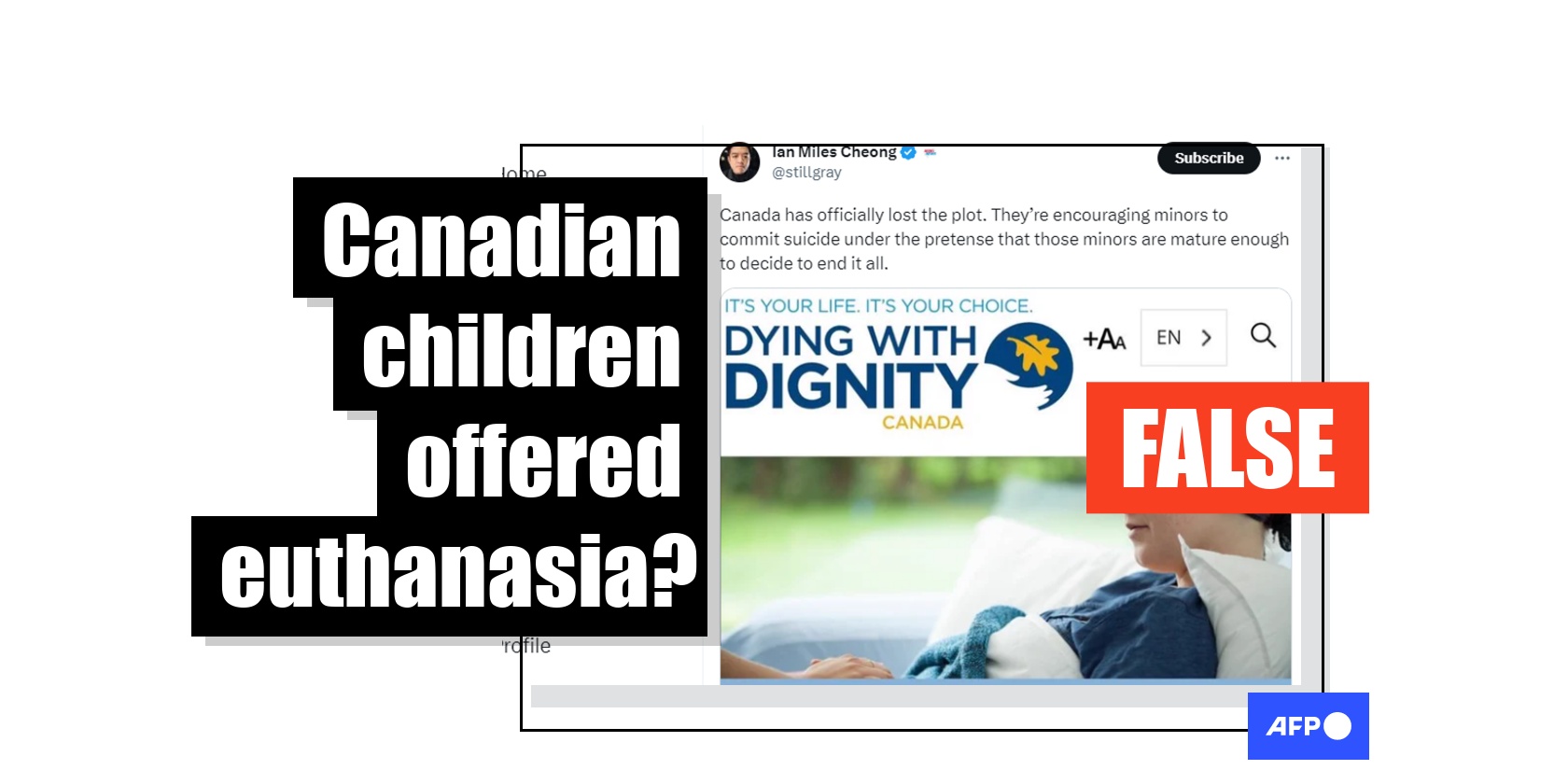
Canada not encouraging medically assisted death for minors
- This article is more than two years old.
- Published on July 28, 2023 at 22:39
- 5 min read
- By Gwen Roley, AFP Canada
"Canada has officially lost the plot. They're encouraging minors to commit suicide under the pretense that those minors are mature enough to decide to end it all," claims a July 19 post on Twitter, which is being rebranded as "X."
It includes a screenshot from the website of Dying with Dignity Canada (archived here) which describes the organization's stance on medical assistance in dying (MAID) for mature minors.
"With the appropriate safeguards in place, mature minors should be allowed the right to choose MAID," the text says.
The July 19 post from Ian Miles Cheong, a far-right blogger favored by Elon Musk, was shared more than 1,600 times. Similar posts using the same screenshot spread across Facebook and Instagram, with some posts expressing incredulity that the procedure would be considered for minors, while others claimed the Canadian government was helping people under 18 access physician-assisted death.
"'Mature Minors' can now kill themselves with Canadian government assistance," a July 19 Facebook post claimed.
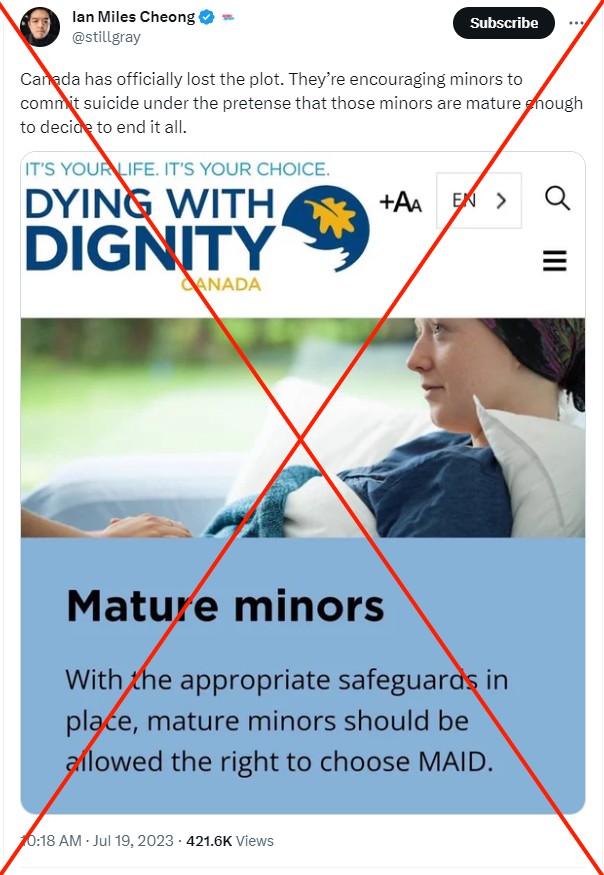
However, the Government of Canada does not allow anyone under the age of 18 to access MAID, as AFP previously addressed.
Anne Genier, a spokeswoman for Health Canada, said in an email that MAID is intended for people who choose medically assisted death while experiencing a grievous and irremediable medical condition, and where suffering cannot be relieved.
Health Canada's website says the current eligibility criteria includes patients who "have a serious and incurable illness, disease or disability," people "in an advanced state of irreversible decline in capability" or who "have enduring and intolerable physical or psychological suffering that cannot be alleviated under conditions the person considers acceptable."
The process calls for an evaluation by at least two independent medical professionals. Genier said alternative services are offered to people who request MAID to explore their options besides ending their life (archived here).
In 2021, Canada formed a Special Joint Committee (archived here) to investigate possible expansions to MAID -- including its availability to mature minors -- but after the report was presented no specific updates were made to the law as the government agreed more consultation was needed.
"While the Government of Canada recognizes the importance of the issues that these recommendations seek to address, these proposals would require further consideration, consultation, and study," Genier said.
"In Budget 2021, funding was directed to support research in areas that focus on MAID, including mature minors," she said. "Health Canada is exploring a range of potential research projects."
Independent advocacy
The screenshot from Dying with Dignity Canada does not represent any type of government stance on MAID -- the organization is an independent charity that advocates for end-of-life rights.
Sarah Dobec, a spokeswoman for Dying with Dignity Canada, said the organization posted the content (archived here) seen in the screenshot, along with other infographics concerning MAID applicants suffering from mental disorders.
Dobec said Dying with Dignity does advocate its stance on MAID to the government, but it does not have any power over changes to the law.
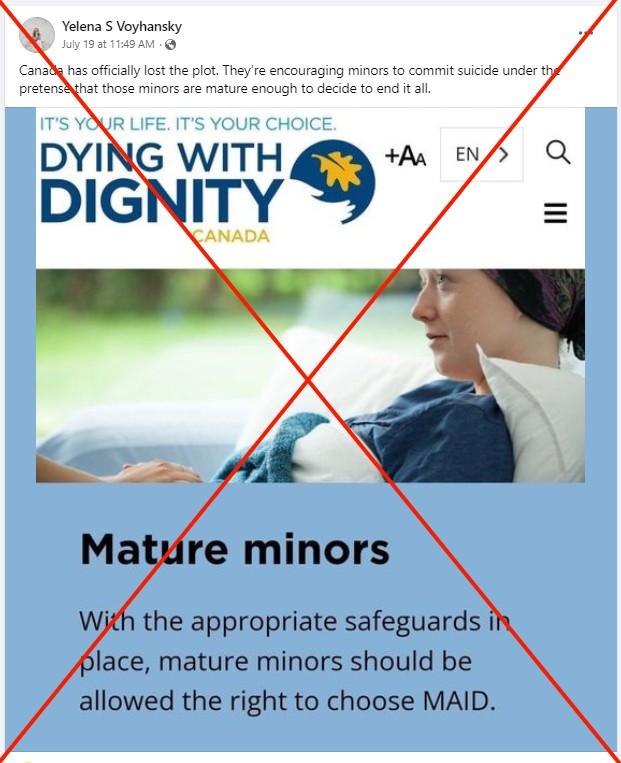
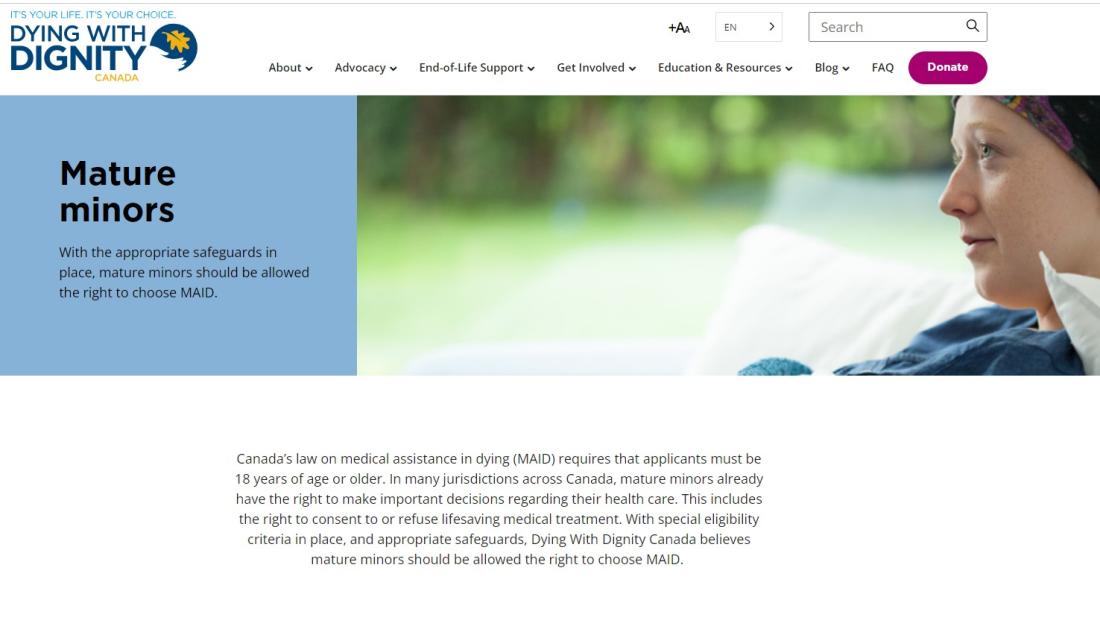
Mature minors
In Canada, parents are generally required to make treatment decisions on behalf of their children, but under provincial and territorial law mature minors -- in some places as young as 14 -- are considered capable of consenting to medical procedures.
Even with this doctrine, Michelle Giroux, a law professor specializing in bioethics at the University of Ottawa, said additional safeguards would need to be in place if MAID were expanded to mature minors, including whether to implicate the parents in the decision.
"Another point would be to evaluate the maturity or the capacity to make this very difficult decision for the child, by discussing the need of an extra evaluation on the mental state," Giroux said.
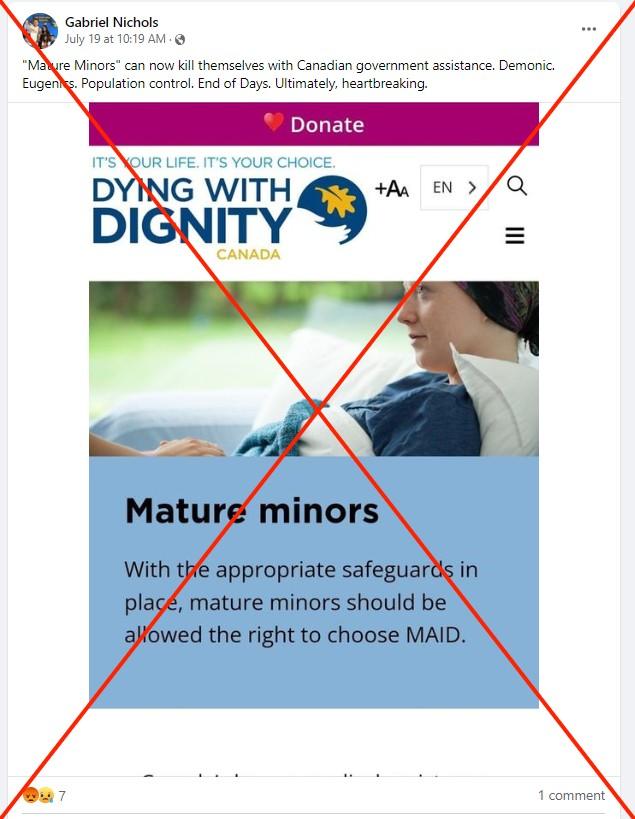
The original rules for MAID were designed and agreed upon by experts and elected officials and the same process would have to be followed to decide if and how the law would be changed to include mature minors, she said.
"This is a question that we will need to reflect on and to discuss in a democratic society," Giroux said.
When the Canadian law allowing MAID was first passed in 2016, a person's natural death had to be reasonably foreseeable to request the procedure. In 2021, the Superior Court of Quebec found restricting access to those with a foreseeable natural demise violated suffering individuals' right to autonomy and the federal laws were updated to include people whose death was not foreseeable.
The availability of MAID to patients who are not terminally ill has sparked debate and concern over people suffering from non-life threatening health conditions who have pursued the procedure, expressing their situation had no foreseeable relief. AFP has also fact-checked misinformation on the topic.
Controversy also erupted over plans to allow the procedure for people solely suffering from mental illness, which was originally scheduled to be applied in March 2023 but was delayed to March 2024 to more concretely outline the eligibility criteria.
Health Canada's Genier said enhanced federal data on the implementation of MAID will be available by summer 2024, which would allow the government to understand how the law could be further expanded.
Approximately 10,000 Canadians exercised their right to medical assistance in dying in 2021, the latest year for which data was available, representing about three percent of total deaths. With the expansion of the law, people whose natural death was not foreseeable represented 2.2 percent of annual MAID provisions in the country for 2021.
More of AFP's reporting on misinformation in Canada can be found here.
Copyright © AFP 2017-2026. Any commercial use of this content requires a subscription. Click here to find out more.
Is there content that you would like AFP to fact-check? Get in touch.
Contact us
